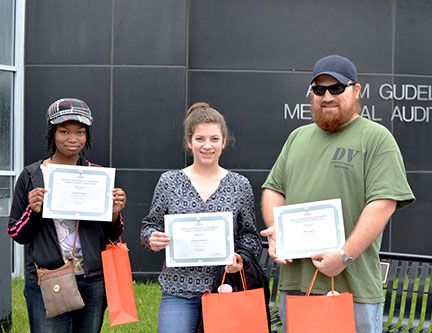Students win climate competition with campus lighting proposal
December 31, 1969A proposal to cut energy costs and improve the student experience through improved lighting at Capitol has won the Climate Change competition sponsored by the university’s engineering department. The event was intended to raise awareness among students about the ways in which engineering solutions can be used to remedy environmental problems.
 Sophia Laschiavo, Amanda Taylor, and Dean Zinetti received the top prize for their entry, which demonstrated the benefits of switching from incandescent tube lighting to an LED system.
Sophia Laschiavo, Amanda Taylor, and Dean Zinetti received the top prize for their entry, which demonstrated the benefits of switching from incandescent tube lighting to an LED system.
“The goal is to reduce the school’s carbon footprint and lower the cost of lighting and electricity,” said Zinetti, the team leader. “The easiest way to do that is to change from tube lights to LED lighting.”
“We built a physical display that included both LED lights and incandescent lights, and used a lumen meter to show the difference in luminosity. And then we used kilowatt devices to show the amperage and wattage of each set of lights. That way you can see the difference in power consumption,” he said.
“Both sets of lights use 120 volts at 60 herz, but the wattage consumption is greatly different. For the same wattage, the luminosity is two thirds greater with the LEDs. We also showed examples of other schools making the switch, and how this not only led to cost savings but had health benefits for the students,” Zinetti said.
Competing teams presented their entries during the Jump Start Juniors event at Capitol on May 5, providing the high school students in attendance with a window into the role engineers can play in addressing issues of wide societal impact.
One of the goals was to show young people that they can make a difference by brainstorming ideas and then developing them into practical projects, said Dr. Nayef Abu-Ageel, chair of the electrical engineering program at Capitol.
“We want students to take an active role and point the way forward to other students,” he said. “It’s important for young engineers to know that they can do something about environmental issues, and indeed any number of issues that are of importance to the community.”
Funding for the Climate Change competition was provided by the National Science Foundation via the Maryland and Delaware Climate Change Education Assessment Research (MADECLEAR) program.


